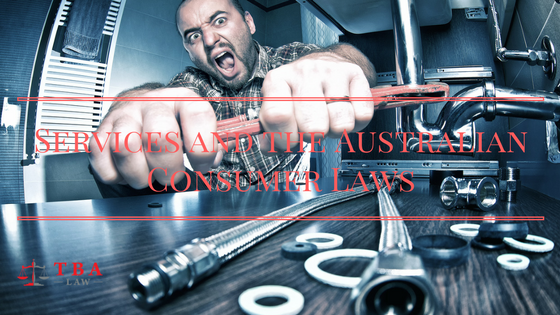We have some previous blogs that describe some of the Australian consumer laws (‘ACL’) regarding the sale of goods, but what about the provision of services?
The ACL includes three consumer guarantees that apply to the provision of services, and like the consumer guarantees regarding the sale of goods, the guarantees applying to services cannot be contracted out of.
Services costing $40,000.00 or less, or services that are normally bought for personal or household use or consumption, attract three consumer guarantees.
A supplier of services guarantees that the services are provided:
- With due care and skill;
- Fit for any specified purpose; and
- Within a reasonable time.

If a supplier doesn’t meet of these three guarantees, the consumer is entitled to:
- A repair, replacement, or refund;
- Cancellation of the service;
- Compensation for damages and /or loss.
The decision as to the remedy given will be then manufacturers decision in the case of a minor problem, or the consumers decision if the fault is deemed a major failure.
If this is all sounding familiar, that’s because the basic principles behind the guarantee for the supply of goods are replicated in the guarantees for the supply of services. A major failure occurs when:
- A reasonable person would not have acquired the service had they known the nature and extent of the failure;
- The services are substantially unfit for their normal purpose;
- The consumer told the supplier about a specific purpose or a specific result they wanted from the supply of the service, and the resulting product did not satisfy this purpose or reach this result;
- The supply of the service creates an unsafe environment.
Where there is a major failure, a consumer may also be entitled to recover damages for any reasonably foreseeable loss flowing from the failure. For example, you hire a plumber to install some new taps in your bathroom. The plumber doesn’t complete the job correctly, and the tap is leaking. This would not constitute a major failure, and the plumber would be required to return to fix the leak. However, if the seal completely fails and water floods your bathroom, this would be a major failure. Not only could you, as the consumer, choose the remedy, you could also be entitled for the costs to repair any damage caused by the water when it flooded your bathroom.
However, if the breach of one of the guarantees is the result of someone else’s actions (excluding employees or agents of the supplier), or events beyond human control, you cannot rely on the consumer guarantees.
For example, you hire a gardener to landscape your outdoor areas, but the job takes two weeks longer than it should have due to excessively heavy rain. A gardener cannot control the weather, so there would not be a breach of the guarantee that work is completed in “a reasonable time”.
If the service is ongoing, such as a subscription based service, and the supplier has breached one or more consumer guarantees, you can opt to cancel the service. If the defect does not amount to a major failure, but the supplier takes an unreasonable amount to time to remedy the fault, it can become a major failure. For a major failure, you can cancel the service and receive a refund of any part of the service not yet consumed.
Cancellation of the service occurs from the time the consumer notifies the supplier. For example, you take out a 12 months subscription of an entertainment streaming service, but cancel the service after only 4 months due to a breach of a consumer guarantee that amounts to a major failure. You would be entitled to receive a refund to the value of 8 months.
So, with this and previous blogs (Guaranteed, Acceptable quality for goods, and Fit for purpose), you should now have a basic understanding of the concepts behind the guarantees for the supply of services. Keep watching for the next consumer law blog, where we will look at the three guarantees in detail, and discuss consequential loss.
[maxbutton id=”2″ ]





Leave A Comment